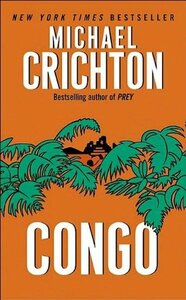Take a photo of a barcode or cover
This wasn't a great book, but it was paced well for reading on a plane. All of the Crichton novels I've read, I've read on a plane.
This is A PERFECT example of a book that blows the movie out of the water. I loved the book, and when I saw the movie I covered my eyes with disgust. Another Michael Crighton slam dunk!
Don't judge me.
I read Jurassic Park as a kid and remember loving it since I didn't have the money to go see the movie when it first came out, but I was an undiscriminating twelve years old at the time. I felt the stirrings of adventure covering Stanley's escapades in Africa teaching imperialism and decided to give Congo a go, and man was I impressed. I don't think I fully appreciated Crichton's attention to scientific detail in anything I've ever read of his before. Congo tells a story that's at the intersection of insatiable cutting-edge corporate greed and the drive and ambition of pure science. A corporate-funded jaunt into the Congo to look for a natural source of ultra-rare type II blue diamonds for next generation optical computers violently and mysteriously disappears. Hoping to get back in the game and to edge out the competition Earth Resources Technologies sends in a back-up team led by an insanely book smart and ambitious Karen Ross with the support of mercenaries and the erudite, but self-absorbed primatologist Dr. Elliot and his gorilla Amy, who's been troubled by nightmares of a mysterious lost city that just so happens to be near the site of the purported diamond mine jackpot. The ensuing adventure is both romantic and scientific and Crichton's writing strongly reminded me of the best of Arthur C. Clarke - informative, daring and exciting all in one. Crichton, like Clarke, seems to have mastered the skill of the academic aside, seamlessly transitioning between narrative and well-researched (often footnoted) information dumps that are as colorful as the best of BBC's Planet Earth or Africa series.
Crichton was way ahead of his time. Published in 1980, the book utilizes what must have seemed like purely fictional gadgetry that is relatively common place and in use today. In fact, if it hadn't been for the explicit reference to political developments in the central African region dated to the 70s, I'd have thought the story was taking place in the early part of the 21st century. All of the technology is within the realm of the plausible, and never the product of pure invention to satisfy particular plot points, as is so often the case in science fiction. The technology is made to serve the story and the story at times feels like a vehicle for spreading the joy of discovery, the wonder of the natural world and a conservation ethos. Braniacs are the heroes rather than gunslinging cowboys and there's a lot of interesting anthropological anecdotes and observations along the way too.
Purely superficial, but I could still revel in the romance of the old-school adventure/travelogue story, especially where lost cities and new undiscovered species are concerned. I'm going to have to give the rest of Crichton's works a look.
I read Jurassic Park as a kid and remember loving it since I didn't have the money to go see the movie when it first came out, but I was an undiscriminating twelve years old at the time. I felt the stirrings of adventure covering Stanley's escapades in Africa teaching imperialism and decided to give Congo a go, and man was I impressed. I don't think I fully appreciated Crichton's attention to scientific detail in anything I've ever read of his before. Congo tells a story that's at the intersection of insatiable cutting-edge corporate greed and the drive and ambition of pure science. A corporate-funded jaunt into the Congo to look for a natural source of ultra-rare type II blue diamonds for next generation optical computers violently and mysteriously disappears. Hoping to get back in the game and to edge out the competition Earth Resources Technologies sends in a back-up team led by an insanely book smart and ambitious Karen Ross with the support of mercenaries and the erudite, but self-absorbed primatologist Dr. Elliot and his gorilla Amy, who's been troubled by nightmares of a mysterious lost city that just so happens to be near the site of the purported diamond mine jackpot. The ensuing adventure is both romantic and scientific and Crichton's writing strongly reminded me of the best of Arthur C. Clarke - informative, daring and exciting all in one. Crichton, like Clarke, seems to have mastered the skill of the academic aside, seamlessly transitioning between narrative and well-researched (often footnoted) information dumps that are as colorful as the best of BBC's Planet Earth or Africa series.
Crichton was way ahead of his time. Published in 1980, the book utilizes what must have seemed like purely fictional gadgetry that is relatively common place and in use today. In fact, if it hadn't been for the explicit reference to political developments in the central African region dated to the 70s, I'd have thought the story was taking place in the early part of the 21st century. All of the technology is within the realm of the plausible, and never the product of pure invention to satisfy particular plot points, as is so often the case in science fiction. The technology is made to serve the story and the story at times feels like a vehicle for spreading the joy of discovery, the wonder of the natural world and a conservation ethos. Braniacs are the heroes rather than gunslinging cowboys and there's a lot of interesting anthropological anecdotes and observations along the way too.
Purely superficial, but I could still revel in the romance of the old-school adventure/travelogue story, especially where lost cities and new undiscovered species are concerned. I'm going to have to give the rest of Crichton's works a look.
adventurous
dark
emotional
hopeful
mysterious
sad
tense
medium-paced
Plot or Character Driven:
Plot
Strong character development:
No
Loveable characters:
Complicated
Diverse cast of characters:
Yes
Flaws of characters a main focus:
Complicated
adventurous
tense
fast-paced
A fun read. Not the biggest fan of Crichton's writing style- Plot driven over character driven. Nevertheless it had some great descriptions of the Congolese jungle, which served as a great escape from modern life, but the story suffered from long-winded and unnecessarily technical tangents that ruined the pacing and immersion.
Diamonds are a Congo expedition’s best friend?
Michael Crichton is one of my all-time favorite authors (aside from the climate change denial). His books always focus on some fringe or up-and-coming technology, allowing fantasy or science fiction to seem almost possible, and Congo is no exception. The story leans into the early ages of supercomputing and the belief that World War 3 will be started with computers, while also providing brain-smashing monsters in the jungle. The last time I read this book was likely somewhere in middle or high school, but I decided to revisit it as I was looking for a stupid, fun adventure. Crichton provided that, a dollop of racist ideas about ‘the dark continent’ of Africa, and enough cannibals to make Dahmer feel uncomfortable.
Congo is a classic adventure book start to finish. Scientists from the United States are plucked out of their laboratories and dropped into the jungle with a seasoned, sarcastic guide, and a group of native porters who know better, but still go along with the scheme. Cannibal tribes, volcanoes, and unknown monsters in the jungle all feature prominently in the story and make it feel like the greatest hits of adventure tropes. In keeping with a standard that felt straight out of the 1920s, Crichton’s descriptions of other races and of Africa were deeply rooted in stereotypes and detracted from the story more than they helped. Later in his life, Crichton became a problematic figure, backing climate change denial, and some of his descriptions in this book make me think he could have been on a darker path.
Pushing that aside as much as possible, Crichton still manages to create some excellent, if not tropey character interactions that drive the narrative. In particular, the sign-language practicing ape, Amy, is a delight and perfect comic relief. Her interactions with the other characters help humanize what is otherwise an unforgiveable group. I found more often than not, I was rooting against everyone that wasn’t Amy.
Without getting into spoilers, the resolution in this book showcases a consistent problem from Crichton’s earlier work. Similar to Grave Descend (2/5 Stars), the third act of Congo goes by in a lightning flash. The final conflict barely gets a beat before the story is suddenly cutting to the epilogue. Part of this issue comes from the problem of constant conflict through the book which gives the impression of incessant terror always building toward something bigger. There is no denouement to speak of, and instead, Crichton has one last fight and cuts to black (sure, I did this when I wrote Whiteout, but I didn’t know better). The lack of resolution beyond a post-credits ‘where are they now?’ epilogue annoyed me a bit.
Final verdict, this book is a page-turner and absolutely the prototypical adventure book, but that comes with some problems of the genre. If Crichton was still alive, I feel like he would be getting some heat about his character descriptions. I enjoyed reading it as I did the first time, and it has helped me through what feels like an adventure novel drought. I’ll recommend this to Crichton fans, or people looking for an escape who can also look past the author’s dated descriptions.
Michael Crichton is one of my all-time favorite authors (aside from the climate change denial). His books always focus on some fringe or up-and-coming technology, allowing fantasy or science fiction to seem almost possible, and Congo is no exception. The story leans into the early ages of supercomputing and the belief that World War 3 will be started with computers, while also providing brain-smashing monsters in the jungle. The last time I read this book was likely somewhere in middle or high school, but I decided to revisit it as I was looking for a stupid, fun adventure. Crichton provided that, a dollop of racist ideas about ‘the dark continent’ of Africa, and enough cannibals to make Dahmer feel uncomfortable.
Congo is a classic adventure book start to finish. Scientists from the United States are plucked out of their laboratories and dropped into the jungle with a seasoned, sarcastic guide, and a group of native porters who know better, but still go along with the scheme. Cannibal tribes, volcanoes, and unknown monsters in the jungle all feature prominently in the story and make it feel like the greatest hits of adventure tropes. In keeping with a standard that felt straight out of the 1920s, Crichton’s descriptions of other races and of Africa were deeply rooted in stereotypes and detracted from the story more than they helped. Later in his life, Crichton became a problematic figure, backing climate change denial, and some of his descriptions in this book make me think he could have been on a darker path.
Pushing that aside as much as possible, Crichton still manages to create some excellent, if not tropey character interactions that drive the narrative. In particular, the sign-language practicing ape, Amy, is a delight and perfect comic relief. Her interactions with the other characters help humanize what is otherwise an unforgiveable group. I found more often than not, I was rooting against everyone that wasn’t Amy.
Without getting into spoilers, the resolution in this book showcases a consistent problem from Crichton’s earlier work. Similar to Grave Descend (2/5 Stars), the third act of Congo goes by in a lightning flash. The final conflict barely gets a beat before the story is suddenly cutting to the epilogue. Part of this issue comes from the problem of constant conflict through the book which gives the impression of incessant terror always building toward something bigger. There is no denouement to speak of, and instead, Crichton has one last fight and cuts to black (sure, I did this when I wrote Whiteout, but I didn’t know better). The lack of resolution beyond a post-credits ‘where are they now?’ epilogue annoyed me a bit.
Final verdict, this book is a page-turner and absolutely the prototypical adventure book, but that comes with some problems of the genre. If Crichton was still alive, I feel like he would be getting some heat about his character descriptions. I enjoyed reading it as I did the first time, and it has helped me through what feels like an adventure novel drought. I’ll recommend this to Crichton fans, or people looking for an escape who can also look past the author’s dated descriptions.
Crichton really lives up to his reputation with Congo! This book was absolutely thrilling and, perhaps unsurprisingly, completely different from the movie version. Every character has unique motivations and the dynamics between them are incredibly nuanced, even within a relatively short amount of time.
Simply a great action novel and a great extension of the rather bare bones movie!
Simply a great action novel and a great extension of the rather bare bones movie!






